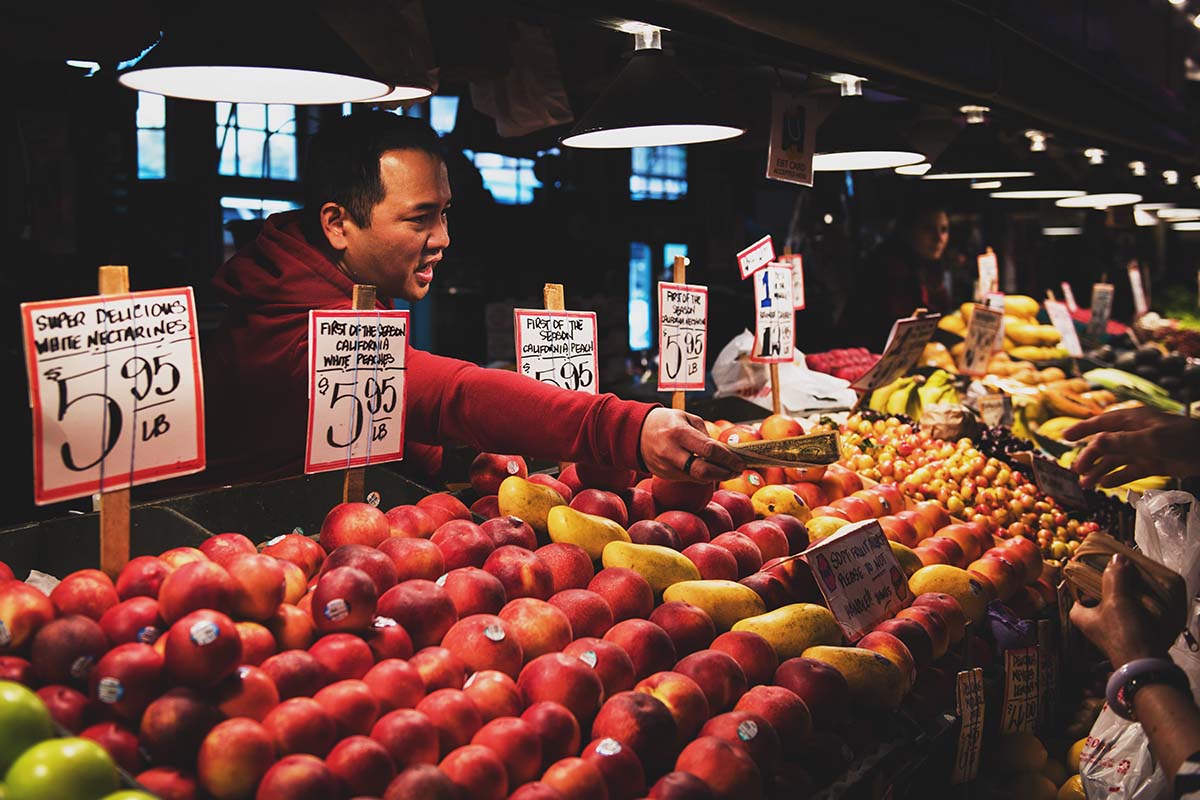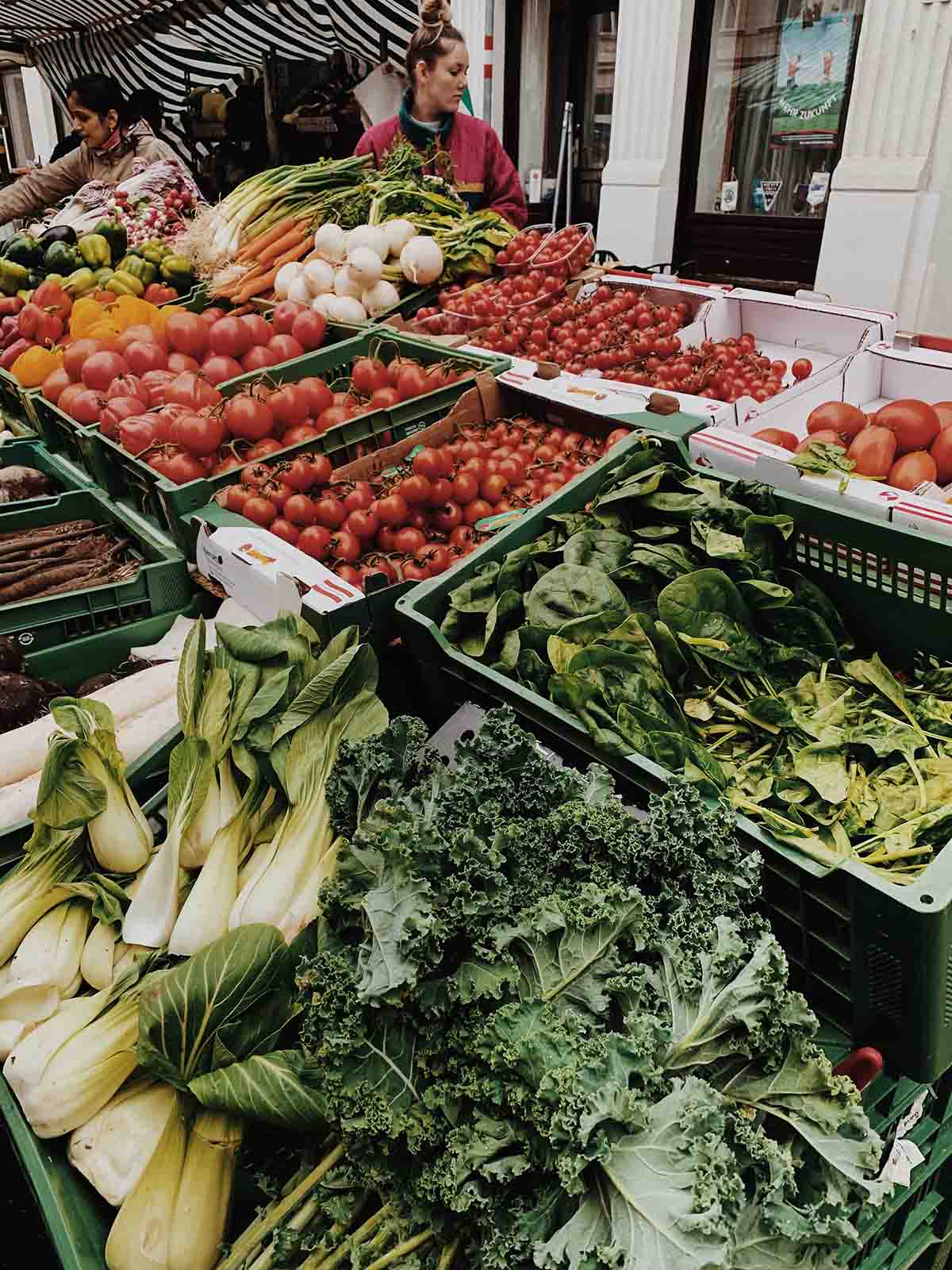Eat more Sustainably: Buy Local & Seasonal
Argentinian lemons stock grocery store shelves in Spain. New Zealand’s native fruit, the kiwi, is now largely produced in Italy. Most of Europe’s peas are actually grown in Kenya. These are all examples of how eating out-of-season and not locally has become commonplace in our diets. Moving food around the world is not new but the rate and inefficiency at which we ship our foods internationally comes at a high environmental cost.
With consumers demanding and expecting a plethora of diverse foods anytime of year, suppliers are happy to fill that need by sourcing food from all over the world; however, these eating habits have devastating environmental impacts when compared to buying foods in-season from your local farmer. A major concern with eating out-of-season and not locally is that transporting these foods long distances increases our dependence on fossil fuels, polluting our air, waterways, and so on. Food’s nutrition is also decreased because it’s picked prematurely and produced with more chemicals in order to survive shipping and handling overseas. Furthermore, this type of consumption does not support local farmers who typically practice small-scale, sustainable farming (i.e. better for the planet).
Let’s look at avocados as an example. This fruit has had major rebranding over the years, making it very popular. In 2015 alone, U.S. avocado sales soared to 1.9 billion pounds (or roughly 4.25 billion avocados), which is more than double the amount consumed in 2005, and four times as many sold in 2000. California and Mexico produce the majority of the world’s avocados and as a result, it has become a major cash crop for these areas. The growing season for this fruit is from March to late July, and yet, the world has avocados stocked in every grocery store all-year-round. If you’re eating avocados and they’re not native to your area and/or they’re out-of-season, you can safely assume that the transportation of this fruit caused more greenhouse gas emissions than if you had purchased a fruit grown closer to home.
Stocking your pantry with seasonally and locally sourced foods is the most sustainable way to eat. In addition to being healthier and better tasting, seasonally and locally sourced food has a smaller environmental footprint than traditional methods of getting your groceries. However, despite farmers’ markets rising popularity in the past years, mainstream grocery stores are still more widely used by consumers because of their competitive prices, convenience, and the variety of produce available year-round.
We get it--eating seasonally and locally can be tough. It’s challenging to eat diverse food groups in all seasons, especially if you live in an area that doesn’t support biodiversity. However, the team here at Luxiders believes changing eating (and buying) behaviors will dramatically improve your environment and health.

Photo by Tim Mossholder
In fact, we think there are 4 key benefits to eating local and in-season food:
- Lowering greenhouse gas emission--Buying foods that grow outside of our home country must be shipped by land, air, and sea to get to the grocery store shelves. This results in significant greenhouse gas emissions. When you eat locally and seasonally, you’re telling the economy that you demand food that’s grown close to home and you don’t need their eco-unfriendly produce--you’re voting with your wallet!
- Supporting local farmers--Being a farmer has always been a tough gig, but it’s even harder today. The rise of environmental degradation has resulted in poor growing conditions for small, local farmers, and on top of that, they’re competing with big chain grocery stores who can provide anything from hand-sliced mango in December to cheaply priced spinach any day of the week. How are small, local farmers supposed to compete with this? Our farmers literally put food on our tables, and they’re typically committed to doing it in a way that supports soil integrity (read: more nutrients in your food) and is more hospitable to the planet.
- More nutritious food for you and your family: Food that is shipped long distances must be picked early, or prematurely, so that it can survive shipping and handling. Not to mention the impact this has on the food’s taste, this means that the produce hasn’t reached its full nutritional maturity. Furthermore, foods grown out-of-season and in greenhouses require an immense amount of energy and chemicals. This results in food that lacks quality and nutrients, and has a higher carbon footprint than locally sourced, seasonal food because of the energy required to maintain a greenhouse.
- Save money: Buying local and in-season is good for your bank account. All the travels that produce takes around the world increases its cost compared to food that’s grown close to home. Additionally, when food is bought seasonally, the supply is greater resulting in lower prices. For example, in the southern United States, berries and peaches are at their peak season in the summer months of June through August. Prices for these fruits are incredibly low compared to winter months because the supply is so large and the fruit can be grown more easily than out-of-season. Eating local and seasonal pays off.

Photo by Ashley Winkler
So, how can you adopt eating seasonally and locally without completely changing your diet? Start slowly. Make the farmer’s market a part of your weekly grocery run. Learn the art of preservation like canning, pickling, and freezing foods so that you have diverse produce in the off-season months, and join your local Community Supported Agriculture (CSA) group. CSA’s provide locally sourced food on a subscription basis that makes it convenient to adopt new habits.
Making even a small change can have major positive results. Make 2020 the year that you adopt new local and seasonal eating habits.


+ Words: Zelda Speight
Zelda Speight is a writer based in the United States whose work primarily focuses on sustainability and conscious consumerism. After studying Anthropology and Public Policy, Zelda became a management consultant where she partners with organizations during large-scale transformations. She leads communications teams for global energy companies and is a freelance writer for publications that share her passion for promoting a more conscious, sustainable lifestyle.
Find her on Instagram @bigsistercomplex




